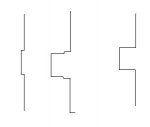Re: Rim/wheel Question
Irregardless of all above, take a look at any trailer hub, they are either rough cast or stamped steel. I have none here that have any sort of machining to except any sort of hub centric rim.
Trailer wheels center themselves with tapered lugs, hub body diameters vary by brand, type and often from other identical part number hubs. I have four new in the box hubs here, all from a major US maker, each one has a rough cast finish with no machined area to accept the rim.
Most trailer rims have an oversized center hole to make them universal fit. That way one rim can fit various trailer applications. For instance, a 5 lug hub will fit rims from 12" up. If you try to mount some car wheel on many trailer hubs, you'll find that the rim's center hole is too small to fit, especially on the heavier duty hubs.
I'd have to check but I'm pretty certain that the standard center hole size for most 5 on 4.5" lug trailer wheels is 3 1/8". (4 hole usually measures 4 5/8", 5 on 5" normally will be 3 1/4", and a 6 lug center hole is usually 4 1/4").
As far as trailers using special wheels, if you go back about 25 or so years, many trailers came with plain but often galvanized car wheels. My 1982 Load Rite trailer came with regular 5 on 4.5" lug galvanized rims, no spokes, no holes for appearance, just plain old rims that would even accept a Ford center cap. Here's a page from 1983 or 84s catalog brochure.
http://i38.tinypic.com/i57uk9.jpg
One of the only auto/truck wheels that come to mind that ware hub centric are the later Ford trucks, a trend that started in 1997 with the introduction of the F150, they used an O ring to center the wheel tightly on the hub, they later put out a bulletin saying to discard the O ring and leave a loose fit. The 1/16" or so of addition play or off center made no difference in ride or vibration. The lugs on those trucks are flat with attached serrated washers.
Unilug or non taper seat aftermarket rims are still lug centered, they use a shouldered lug vs. a tapered seat lug to center the rim on the stud, some early aftermarket wheels used keyed or shouldered washers as well.
These probably aren't the best choice as a trailer wheel for both strength and corrosion issues. I never run aluminum wheels on my trailers since aluminum in contact with steel only makes for a corrosion problem in saltwater.
As far as the original question here, as stated several times above, there is nothing wrong with the rim's center being larger than the hub, it's the case on most all trailers.





















